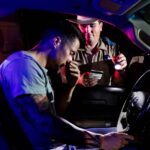YOU ASKED ~ WE ANSWERED!
Are Checkpoints legal and constitutional or not? Do I consent to Checkpoints automatically because I have a driver license? YOU ASKED, WE ANSWERED:
DWI Checkpoints ~ Are they legal and constitutional or not? Do I Consent to Checkpoints because I have a driver’s license in MO?
The 4th amendment to the Constitution gives us the Right against unreasonable searches and seizures. Once there’s Probable Cause to believe a crime has been committed a Search and Seizure usually will be determined by a Court to be legally reasonable. It follows that without Probable Cause most searches and seizures would be determined by a Court to be legally Unreasonable. A random search, or a burdensome search, without more is generally determined by a Court to be an Unreasonable search.
The moment an officer stops a car at a DWI Checkpoint a legal “seizure” occurs merely because the driver is forced to pull over and may not leave until a cop says so – period. So a Checkpoint stop is a seizure, nobody really debates that issue, the real question becomes is a Checkpoint stop a LEGAL seizure?
Lets apply the tests. #1 Probable Cause – that one is out the window since it’s next to impossible to argue that probable cause exists before the police stop each car at a Checkpoint. #2 Burden: I suppose there might be a person out there who considers their experience at a Checkpoint to be no burden at all. But personally, I find everything about a Checkpoint to be burdensome. First off, I’m eagerly awaiting the day that I’m driving down the road with absolutely nothing to do and time to kill – just interrupting my path of travel is burdensome. Honestly, I’m not too hip on being forced to answer questions about where I’ve been or where I’m going, nor being forced to identify myself and produce insurance or registration paperwork. So it’s probably obvious how I’d feel about being ordered out of my car and forced to perform 20+ minutes of field sobriety testing in the dark on the side of the road… all because I’m on the road trying to get home after a long day.
So if Checkpoint seizures arguably fail the constitutionality tests that our courts use to judge other searches and seizures, then why are they “legal”? Our Supreme Court has determined that the word “unreasonable” is a malleable concept. The Supreme Court ruled that it is reasonable to minimally intrude on a person’s constitutional Right against searches and seizures because the State has a need to prevent drunk driving accidents. Since that Supreme Court ruling, the State Courts have developed precedent over time interpreting what constitutes a “minimal intrusion” during a DWI Checkpoint.
So, each Checkpoint must meet certain criteria by State. That being said, just because you see a Checkpoint happening does NOT mean it’s being conducted legally. Simply put, in MO the criteria for lawful Checkpoints involves being located in areas of prior alcohol related accidents, written procedures and supervision for the Checkpoint, notice of the Checkpoint, safety during the Checkpoint and minimal delay to passers through. Further, the Supreme Court’s ruling about the legality of DWI Checkpoints does not mean that “Drug Checkpoints” or “Safety Checkpoints” or “DNA Roadblocks” are blessed by the Supreme Court – they in fact are NOT.
People sometimes ask me about “implied consent” in MO as it relates to Checkpoints. In MO when you apply for and accept a driver’s license you give “implied consent” pursuant to RSMo 577.020. Specifically, you ONLY give implied consent to a breath, blood or urine sample AFTER you’ve been ARRESTED for DWI. There is also a limited provision for implied consent when there’s an accident involving death or serious injury. So far, MO’s “implied consent” laws have NOTHING to do with consenting to checkpoints.
Did you receive a DWI as a result of a DWI checkpoint? If so contact Attorney Casey Coats at (314) 644-7102.









